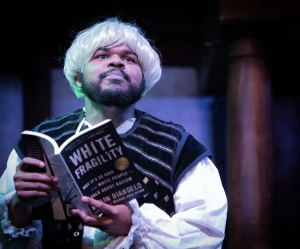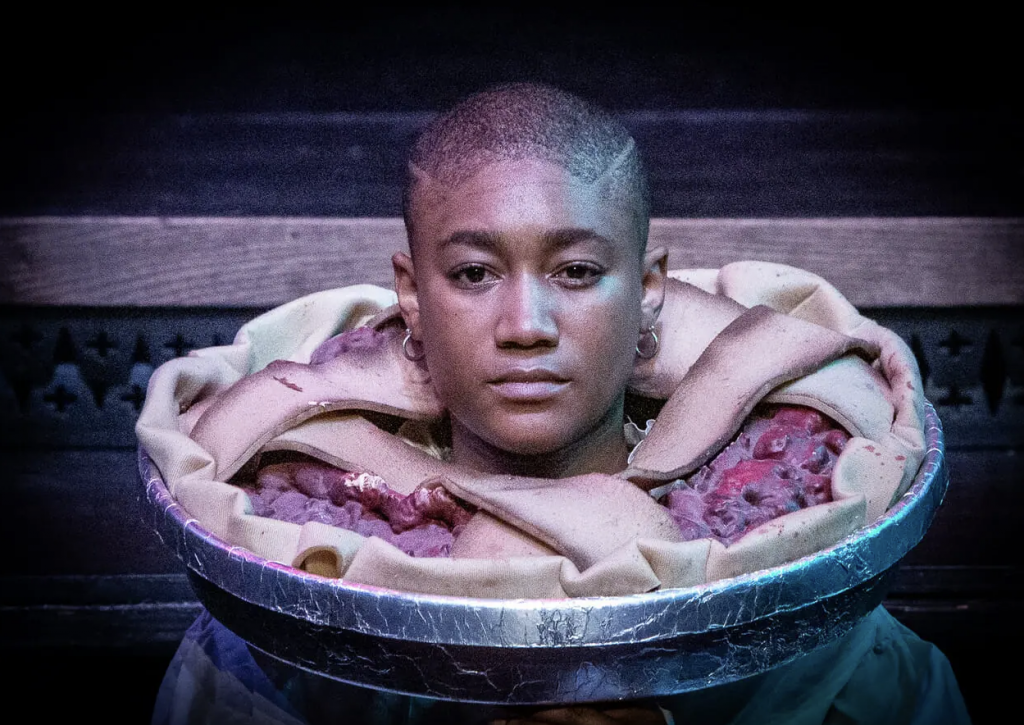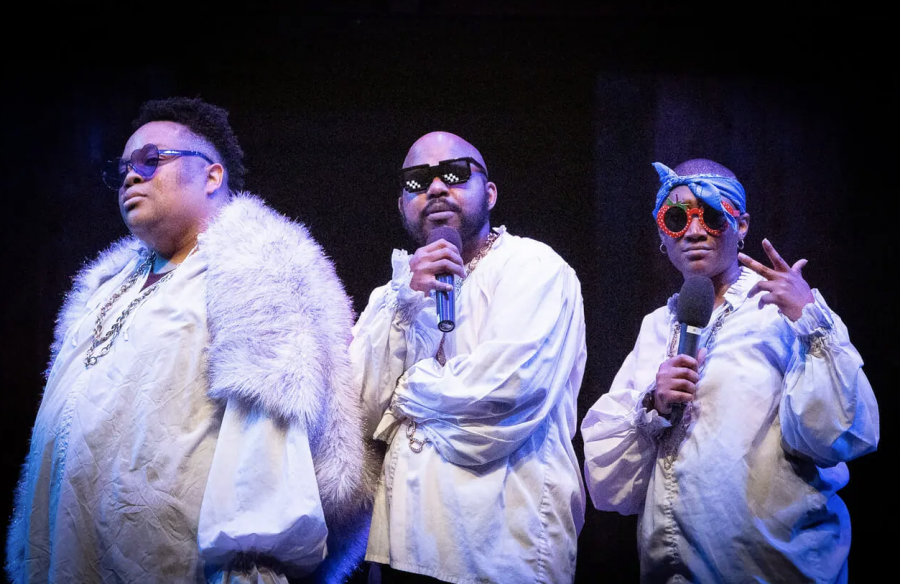The plays aren’t the thing that drives The Complete Works of William Shakespeare (Abridged), onstage at the Atlanta Shakespeare Company through September 4. This very funny show succeeds entirely because of the talent and charm of its ensemble and the strength of its direction.
The mission of this production, from a script written by Adam Long, Daniel Singer and Jess Winfield that allows for the inclusion of a lot of Atlanta flavor and improvisation, is a celebration of Blackness. All audiences should join this celebration — with its many wild turns, it’s a lot of fun. It’s bold, joyous, sharp, unapologetically political, delightfully queer, thoroughly unpredictable and to-the-minute with its included pop-culture references and jokes.
Shakespeare’s works provide the production’s framework, but this is less about scholarship and more about zaniness. The script gives the performers a method of attack for presenting the Bard’s tragedies, histories and comedies. But each performance is likely different, given the leeway that the playwriting allows everyone onstage and how much audience reaction can affect how Shakespeare (Abridged) goes.
On opening night, individual audience members kept bursting into laughter when Hamlet’s wig would go askew, for instance, which led the cast to break character, begin laughing themselves and start over. Highlights and embellishments are part of the fun. The actual charms and personalities of the characters onstage come into play more in this production than any other in memory staged at the Shakespeare Tavern Playhouse. It’s the most openly pro-Atlanta production staged locally in ages.

To be or not to be: Hamlet (O’Neil Delapenha) reads meaningless “words, words, words” from “White Fragility.”
This city is a beacon for Black culture and beauty, and Shakespeare (Abridged) places it front and center with a full BIPOC cast taking on the works of an old White man, putting them in a different perspective.
At one point, Shakespeare is accused of plagiarism, as the author took inspiration for his works, including Romeo and Juliet, from many Italian stories. But it is clarified that Shakespeare didn’t so much plagiarize as appropriate another culture.
From the moment the staging begins, with performer Ebony Jerry dancing onstage and calling out the tech crew to change her entry music, director Charlie T. Thomas creates a loose, open party vibe with little separation between the audience and cast. In fact, nonbinary cast member Trevor Perry gets their start by posing as a flirty, adorable and hilarious member of the audience who is drafted into the show. Rounding out the cast is self-proclaimed Shakespeare scholar O’Neil Delapenha, who has a goofy charm and exhibits a strong desire to be respected by the audience.
The game of the script is simple. The rules of basic storytelling apply: You give your characters a want, set them on the path to getting it and then fill the rest of the story with roadblocks and obstacles that keep them from their goal.
Here, these performers, going by their own names, are our protagonists. Ebony, Trevor and O’Neil are going to give the audience everything we need to know about Shakespeare’s works condensed into a very short amount of time, limited by the number of performers, the costumes they have at the ready and the impenetrability and interchangeability of many of the lesser-performed plays.
Running gags involve Ebony’s swagger, Trevor’s femininity and O’Neil’s insecurity. Perry, in particular, steals scenes whenever they are given a wig and an opportunity to vamp as Juliet, Ophelia or Gertrude.
The performers’ own feelings and hang-ups about doing certain plays also creates obstacles in the presentation. At the half, to avoid doing Hamlet, Trevor flees the stage for Hartsfield-Jackson Airport. O’Neil pursues them. And Ebony decides to stall for time by engaging the women from the stage crew in a spontaneous talk show about Shakespeare’s women characters who deserved better from trashy men.
Though every play in the catalog gets mentioned, Shakespeare (Abridged)‘s first act largely is devoted to Romeo and Juliet, wherein Ebony-as-Romeo tries to romance Trevor-as-Juliet. But Trevor is more interested in fake vomit and spraying the audience with silly string whenever the chance comes.

The “Titus Andronicus” cooking show takes an unfortunate turn for Ebony Jerry.
The second act is mostly devoted to Hamlet, where Trevor, O’Neil and Ebony get the chance to examine Ophelia’s psychology through an elaborate, raucous audience-participation exercise. During it, the full audience chanted in chorus, one man was pulled onstage to run laps, and another woman stood at the center of it all and screamed.
Seriously, no matter how much Shakespeare you’ve read, nothing will prepare you for the references to the Atlanta Falcons, Family Matters and Beanie Feldstein’s ouster from the Broadway revival of Funny Girl.
Other highlights included a sidebar about what it’s like for Black performers to audition for Othello, getting notes from casting agents that advise them to lean into stereotypes and racist cliches. The Titus Andronicus cooking show segment was solid. And the moments where the cast performs Hamlet backward and at double-speed were just impressive.
What makes all of this work is the personality of the performers and their fearlessness in pursuit of fun. The whole enterprise feels revolutionary, intimate and local because Black performers haven’t gotten many chances to solely own the stage in quite this way at the Tavern. And Atlanta is rich with BIPOC talent like Perry, Delapenha and Jerry.
In this Shakespeare (Abridged), thanks to the careful choices made by the director, the performers get to show us versions of themselves, in addition to dozens of characters they take on. And that familiarity generates much audience affection.
Benjamin Carr
::
Benjamin Carr, a member of the American Theatre Critics Association, is an arts journalist and critic who has contributed to ArtsATL since 2019. His plays have been produced at The Vineyard Theatre in Manhattan, as part of the Samuel French Off-Off Broadway Short Play Festival, and the Center for Puppetry Arts. His novel Impacted was published by The Story Plant in 2021.

